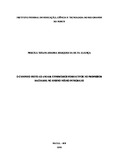O caminho feito ao andar: itinerários formativos do professor bacharel no ensino médio integrado

Data
2016-04-25Autor
Aliança, Priscila Tiziana Seabra Marques da Silva
http://lattes.cnpq.br/9472832855660995
Metadado
Mostrar registro completoResumo
ABSTRACT
This dissertation aims to discuss the formative itinerary of teachers who have not been through proper institutional teaching education and teach “Ensino Médio Integrado”, which is a teaching offer that articulates high school education and vocational training. The research took plave within the Mechatronics course at the Federal Institute of Education, Science and Technology of Rio Grande do Norte – Parnamirim. This investigation relies on the theoretical basis of the (auto)biographical approach as to support the construction of the data. The analysis material was built from the formative narratives of five teachers who have a bachelor’s degree (not a “licenciatura” degree, which is the specific degree for future teachers). The notion of EMI is based on the works of Marx (2011; 1965), Gramsci (2010), Moura (2008; 2010), Saviani (2003) and Frigotto, Ciavatta and Ramos (2005). The core document of the Technical Vocational High-School level Education Integrated to High School (BRASIL, 2007) presents the fundamental categories of EMI: (1) wholesome humane education; (2) work, science, technology and culture as integral parts of humane education; (3) work as an educational principle; (4) research as an educational principle; (5) relationship between the parts and the whole perspective. EMI is also based on polytechnic education and a unitary schooling that could surpass the structural dichotomy. The (auto)biographical approach is based, according to Passeggi (2011, p. 20-21), on three principles: (1) the “construction of reality through language by the individual of the group”; (2) language as a “mediator element of the subject’s historicity, through practical hermeneutics”; (3) research as a “political and epistemological stand”. This research relies on the studies of self-narratives (PASSEGGI, 2010; 2011; 2012; 2014; JOSSO, 2004; 2010) and memory and narrative (SARLO, 2007; BOSI, 2003; 2004), as well as philosophers that articulate action and experience (LARROSA, 2006) and action and narrative (RICOEUR, 1994). The analysis of the formative narratives indicates that those teachers count on, primarily, their own memory of their school years and grad school years to establish their first pedagogical practices. Secondly, they rely on support from their colleagues and daily experience. The results also show a disconnection between the self-formative processes of the teachers and the foundations of EMI, indicating that a systematized ambience of education is necessary.



